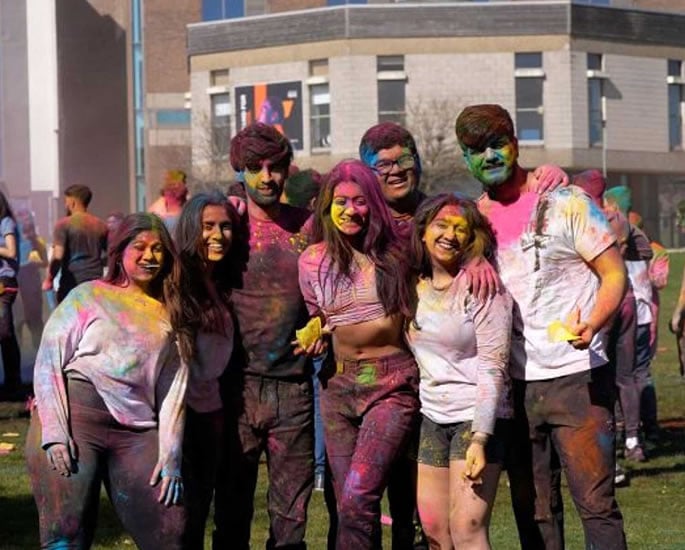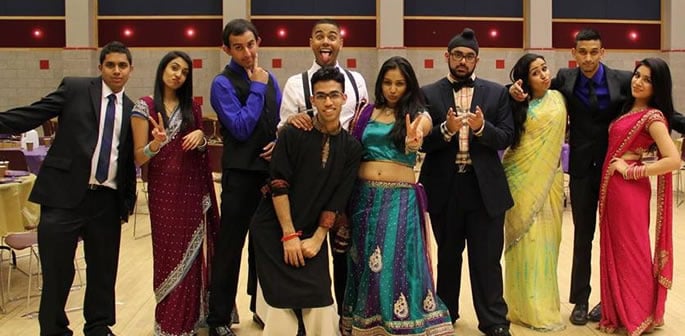"It instantly made me feel like I belonged."
For many young British Asians, the first steps onto a university campus are a mix of excitement and trepidation.
It is a time of newfound independence, academic ambition, and the daunting challenge of building an entirely new social life from scratch.
In this swirling world of unfamiliar faces and strange surroundings, British Asian societies emerge as vital anchors, offering a powerful sense of belonging and a celebration of cultural identity that connects deeply with students from all backgrounds.
These societies are a dynamic and essential part of the university experience for countless students, providing a vibrant platform for cultural expression, professional development, and unwavering support.
Their growing prominence on campuses across the UK is a clear testament to their essential role in fostering a more inclusive and culturally rich academic environment.
As the student population continues to diversify, the significance of these student-led organisations in nurturing a positive and holistic university experience cannot be overstated.
They are the cultural heartbeat of the campus, a comforting and familiar embrace in a new setting, and a launchpad for future success.
A Home Away from Home

For many British Asian students, university marks the first time they have lived away from the family home.
This transition can often bring a profound sense of longing for the familiar sights, sounds, and traditions of their cultural heritage.
British Asian societies expertly fill this void, creating a welcoming and supportive “home away from home”.
They provide a unique space where students can instantly connect with others who share similar upbringings and cultural values.
Anika, a recent graduate from Warwick University, said:
“I was really struggling with homesickness during my first term.
“Then I went to the society’s Diwali event. The music, the food, the familiar faces… it was like a little piece of home on campus. It instantly made me feel like I belonged.”
This sense of community is crucial for students who may find themselves feeling like a minority on a predominantly white campus, helping to alleviate feelings of isolation.
These student-run groups are instrumental in keeping cultural traditions alive and thriving on campus. They organise a wonderfully diverse calendar of events, from colourful Diwali balls and festive Eid dinners to energetic Bollywood nights, celebrating the rich and varied culture of South Asia.
These gatherings are not exclusive; they are open to the entire university community, which actively encourages cross-cultural understanding and appreciation.
The simple act of sharing a meal, celebrating a festival together, or enjoying familiar music and humour can have a profound impact on a student’s sense of belonging.
It can significantly ease the often-difficult transition into university life, providing a stable and reassuring link to their identity and heritage when everything else feels new and uncertain.
Building Networks

Beyond the crucial cultural and social spheres, British Asian societies play a pivotal role in the professional development of their members.
They provide invaluable networking opportunities, connecting current students with alumni and established professionals from a wide range of industries.
These connections can be instrumental in securing coveted internships, graduate scheme placements, and vital mentorship opportunities.
Recent Coventry University graduate Samir explained:
“The society hosted a networking dinner with alumni in the finance sector.
“I ended up speaking to a partner at a major accounting firm who gave me his card.”
“That conversation led directly to my summer internship, and eventually, my graduate job. I genuinely don’t think I’d be where I am today without that connection.”
These societies also serve as an excellent training ground for future careers.
Students who take on committee roles gain direct, hands-on experience in crucial areas such as event management, marketing, financial budgeting, and public speaking.
These are all highly transferable skills that are actively sought after by employers across all sectors.
Muhammad Taha Khan is the former President of the University of Huddersfield’s Students’ Union.
He was inspired to become the equalities officer in 2022 after noticing a distinct lack of South Asian representation in leadership positions.
He said: “My motivation for wanting to become the equalities officer was to be a catalyst for opening doors for the South Asian community so that they could see themselves in positions that they may not have considered achievable previously.”
His journey clearly demonstrates how these societies can empower students to become agents of positive change and to champion diversity and inclusion within their institutions and beyond.
Celebrating Diversity on Campus

It is a common misconception that British Asian societies are exclusively for British Asians.
In reality, they are inclusive, open, and welcoming organisations for students from all backgrounds who share an interest in South Asian culture.
Priya, who is part of the University of Birmingham’s Indian Society, said:
“My flatmate, who isn’t Asian, was hesitant to come to our Bollywood night at first.
“I convinced her to come along, and she had the time of her life. She said it was the most fun she’d had all year.
“That’s what we’re about – not creating a bubble, but sharing our culture with everyone and showing them a good time.”
This deliberately open and welcoming approach is absolutely key to fostering a genuinely multicultural campus environment where students can learn from one another and celebrate their differences in a respectful and engaging way.
By organising cultural showcases, food festivals, film screenings, and educational talks, these societies help to educate the wider student community about the rich and diverse heritage of South Asia.
They actively challenge harmful stereotypes and prevalent misconceptions, promoting a more nuanced and accurate understanding of British Asian identity in the 21st century.
In doing so, they contribute directly to a more tolerant and inclusive campus culture, where all students feel valued, seen, and respected.
These societies are at the forefront of celebrating the multicultural fabric of British universities, enriching the student experience for everyone, not just their members.
A Support Network

The transition to university can be an incredibly stressful period, and during this time, some students may struggle with their mental health.
British Asian societies can function as a crucial source of support and relief.
With their packed calendars of cultural events and social gatherings, they provide a much-needed and healthy outlet for students to de-stress, have fun, and connect with their peers in a relaxed and informal setting.
The friendly, non-judgmental, and welcoming atmosphere of these societies can make a significant positive difference to a student’s overall happiness and well-being.
Moreover, these societies act as an essential support network for students facing specific challenges related to their cultural identity.
Anika said:
“There are certain pressures and expectations that come with being a British Asian kid that my other uni friends just didn’t get.”
“Being able to just sit with people in the society and have a laugh, knowing they understood where I was coming from without me having to explain everything, was a massive relief. It was my safety net, honestly.”
For students who may be reluctant to seek formal mental health support from university services, the informal peer support offered by these societies can be an invaluable, and sometimes life-saving, resource.
British Asian societies are an important part of the university landscape in the UK.
They are vibrant, dynamic, and multifaceted organisations that play a profoundly important role in the lives of thousands of students.
They provide a vital sense of community and belonging, a platform for authentic cultural expression, a springboard for professional success, and a critical support network.
As universities continue to strive to create more inclusive, diverse, and supportive environments for their students, the importance of these societies cannot be overstated.
For any British Asian student starting their university journey, joining their South Asian society is not just a way to make friends; it is a wise investment in their personal, professional, and cultural development.






























































